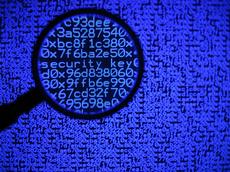Avi Wigderson: The Computational Lens
The Wolfgang Pauli Lectures in 2012 are devoted to mathematics: The Israeli mathematician Avi Wigderson examines the world’s major problems from a computer scientist’s point of view, exploring in depth the frontiers of human and computer knowledge. The lectures are all in English and do not assume any specialist knowledge or particular background.

The case is legendary: in the Second World War the German armed forces encrypted their messages so cunningly that the Allies had no chance of protecting their warships against German U-boat attacks. But then the mathematician Alan Turing arrived on the scene and broke the code, marking a turning point in the war at sea. Encryption techniques have become somewhat more complex since then. Nonetheless, even today no mathematician or computer scientist is able to prove that a particular code cannot be cracked.
Congruously this year’s Wolfgang Pauli Lectures will be dedicated to Alan Turing, the father of computing, on the hundredth anniversary of his birth. These lectures will be hold by Avi Wigderson, professor of Mathematics at the Institute for Advanced Study in Princeton. Wigderson has been for two decades a leading figure in the field of Mathematics of Computer Science, with fundamental contributions, in particular in Complexity Theory, Randomness, and Cryptography.
Computation theory has revolutionized our lives
Avi Wigderson is someone who unlocks the secrets of
Internet security and explores the limits of human knowledge. Anyone who follows
the Israeli mathematician’s thinking will sail to far horizons, because the
problems he deals with are major and fundamental. Just listening to Avi
Wigderson is an experience: not only is he sharp-witted, he is also a skilful
orator (see Avi Wigderson’s video lectures).
“His results are astonishing every time, but he presents them in such an electrifying manner that one can easily and gladly follow him every step of the way”, says Thomas Holenstein, Assistant Professor at the Institute of Theoretical Computer Science. Like Wigderson, Holenstein carries out research in the field of computational complexity theory. Computational complexity theory, studying the power and limits of computing systems, provides the mathematical foundations of computer science and technology.
«The advent of computation theory, followed by computing practice, has completely revolutionized our lives. Common objects of other disciplines, including mathematics and the sciences, often reveal new facets when viewed through the computational lens», says Avi Wigderson. «In this series of three lectures I plan to explain some central aspects of this extensive theory, and their consequences and challenges.»
Wolfgang Pauli Lectures 2012
The Wolfgang
Pauli Lectures are an annual lecture series that is devoted alternatingly to Physics,
Mathematics and Biology. They are named after the great theoretical physicist
and Nobel laureat Wolfgang Pauli, who was professor at ETH Zürich from 1928
until his death in 1958. The first Wolfgang Pauli Lectures were given in 1962
by Max Delbrück, and over the years there have been many eminent speakers,
including a number of Nobel laureats.
All lectures take place in
the Auditorium Maximum, ETH Zurich, HG F 30. The lectures are all in English
and do not assume any specialist knowledge or particular
background.
First
lecture: 7 May, 20:15 hrs
The
"P vs. NP" Problem: Efficient Computation, Internet Security, and the
Limits to Human Knowledge
Abstract:
The "P vs. NP" problem, formulated by
computer theorists in the 1970s, quickly became a central outstanding problem
of science and mathematics. In this talk Avi Wigderson will attempt to describe
its mathematical, scientific and philosophical content. He will discuss its
status, and the implications of its resolution on science and technology
(making clear that the $1M prize on solving it pales in comparison with these
implications) .
Second
lecture: 8 May, 20:15 hrs
Cryptography: Secrets and Lies, Knowledge and
Trust
Abstract:
What protects your computer password when you log on,
or your credit card number when you shop on-line, from hackers listening on the
communication lines? Can two people who never met create a secret language in
the presence of others, which no one but them can understand? Is it possible
for a group of people to play a (card-less) game of Poker on the telephone,
without anyone being able to cheat? Can you
convince others that you can solve a tough math (or SudoKu) puzzle, without
giving them the slightest hint of your solution?
These questions (and their remarkable answers) are in
the realm of modern cryptography. In this talk Avi Wigderson plans to survey
some of the mathematical and computational ideas, definitions and assumptions
which underlie privacy and security of the Internet and electronic commerce.
Avi Wigderson will show how these lead to solutions of
the questions above and many others. He will also explain the fragility of the
current foundations of modern cryptography, and the need for stronger ones.
Third
lecture: 10 May, 20:15 hrs
Randomness - the Utility of Unpredictability
Abstract:
Is the universe inherently deterministic or probabilistic?
Perhaps more importantly - can we tell the difference between the two?
Humanity has pondered the meaning and utility of
randomness for millennia.
There is a remarkable variety of ways in which we
utilize perfect coin tosses to our advantage: in statistics, cryptography, game
theory, algorithms, gambling... Indeed, randomness seems indispensable! Which
of these applications survive if the universe had no randomness in it at all?
Which of them survive if only poor quality randomness is available, e.g. that
arises from "unpredictable" phenomena like the weather or the stock
market?
A computational theory of randomness, developed
in the past three decades, reveals (perhaps counter-intuitively) that very
little is lost in such deterministic or weakly random worlds. In the talk Avi
Wigderson will explain the main ideas and results of this
theory.








READER COMMENTS